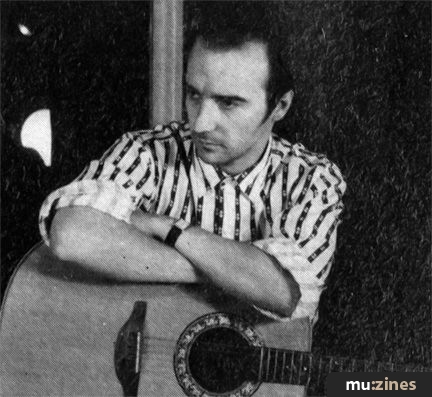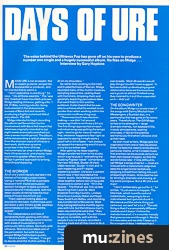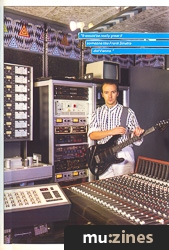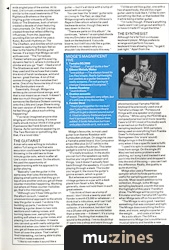Magazine Archive
Home -> Magazines -> Issues -> Articles in this issue -> View
Days of Ure | |
Midge UreArticle from International Musician & Recording World, December 1985 | |
Gary Hopkins lends an ear to the Caledonian Crooner
The voice behind the Ultravox Pop has gone off on his own to produce a number one single and a hugely successful album. No flies on Midge...

MIDGE URE is not an expert. Not an expert guitarist, songwriter, keyboardist or producer, and he'd be the first to admit it.
"I don't specialise in one thing", he says, "I do all those wee bits." The 'wee bits' however have mounted up to see Midge leading Ultravox, getting a No. 1 hit, If I Was, running a studio, being instrumental in the phenomenal success of Band Aid and recently producing a highly acclaimed debut solo album, The Gift.
Midge intended to begin recording the album last November but his involvement with Band Aid meant that what was originally intended to last eight weeks eventually stretched out over a seven month period. The album, while not sounding a radical departure from the dramatic style of Ultravox's best work, did throw up some surprises in the form of three instrumentals (an area in which Midge feels Ultravox could, and should, have explored to greater effect) and in Midge's general approach to writing, recording and playing.
THE WORKER
All of Ure's work literally started in the kitchen of his large London home. Using a Yamaha PS-6100 (a portable keyboard with digital percussion section) he began to work out chord sequences and melody parts, with the latter usually dictating how the final piece of music would turn out.
"Then I started looking about for sounds for the basic rhythm track and I put down a very simple guide, and then put a melody on top and filled the spaces".
The independence and lack of constraints from working with other musicians made Midge come to terms with areas of musicianship he'd previously left to others. Normally with Ultravox, Warren Cann takes care of the percussion, but with his own project Midge had to learn quickly.
"All of a sudden," he says, "I've got to decide what the rhythm will be. It's all on my shoulders."
So rather than sticking to the tried and trusted formats of Warren, Midge recorded many of the rhythm tracks by sampling biscuit tins, racking them with hammers, dropping them and generally exploring percussive ideas that were fresh to him and his audience. It also meant that he was able to achieve what he wanted much quicker than when working within the democratic confines of a group.
"There was much less decision making — we didn't sit around analysing it before we threw a bit out. The first thing I approached on each individual song was getting the tempo right. I tend to go for natural instinct first, whatever happens to feel right as opposed to saying it might work a good half or third faster. I can always varispeed the track at the end if it's only a tiny bit out either way."
After getting his ideas together, Midge transferred them to his studio, which is as he puts it "everything the budding Popstar needs" comprising a Harrison M3 desk, Studer 24 track (A80) recorder, Studer 1/2 inch and 1/4 inch mastering and F1 digital mastering system. Ultravox's Lament album was in fact recorded at his 'home' studio. Here Midge put his final ideas together before recruiting guest musicians to come in and, "fill in the spaces." The final all-star line up was Mark King from Level 42, Mark Brzezicki from Big Country, Lindsay Elliot from Cockney Rebel and Nigel Ross-Scott from Reflex, and recording was transferred to Monserrat. Mark King had agreed some months ago to play with Ure, but the Ultravox man's basic requirements were that, "they were just good players. You don't have to get on incredibly well with the people if you've already recorded a backing track and all they have to do is to come in and play along to a tape machine." Did this rule out any thoughts of genuine collaboration?
"Not really. For instance I'd write a proper drum machine part as a guide and then I'd say, 'OK, you do all your own breaks.' Mark (Brzezicki) would play things I couldn't even suggest. In fact we ended up developing a great relationship because the musicians were given an almost finished song, they listened to it and then expanded on it — that's all..."
THE SONGWRITER
On the album Midge co-wrote most of the songs with Danny Mitchell from Messengers, a Scottish duo, in a partnership that has gone on for some years. Thankfully on The Gift Midge writes to his strengths — large dramatic themes, rich keyboard fills, moody atmospheres, soaring choruses, in fact all the positive elements you find when Ultravox click at their best.
As with most writers, Midge gets his inspiration from one or two situations. Either he feels the need to write about a particular theme, or he'll create music first and then let the sounds conjure up their own typical imagery, so that the words follow later. It'd be difficult to call Midge's songs cheerful — most are imbued with a melancholic edge that sees the singer/writer tentatively stopping himself from falling into a pit of downright misery. At his best he can be stirringly dramatic and moving, at his worst pompous. But is Mr Ure a sad man?
"I don't deliberately go out for it," he smiles, "it just seems to happen. The title track, which is pretty sad and melancholic, was going to be an instrumental but I got a bit drunk in Monserrat and the whole thing just came out, so I said 'let's try it'. The odd thing is that it's a completely different melody and it doesn't follow the melody line at all, it's a counter melody that goes across and through it. We did it in two takes and we didn't listen to it for a couple of days. I realised that it really captured that melancholy atmosphere — we couldn't try to create it, we couldn't make it."
It's ironic that while Ure's lyrics harken back to a romantic past, his music also has distinctive links with the wide angled pop of the sixties. At its best, Ure's music creates soundscapes similar to the vocal treatments of The Righteous Brothers or the spine tingling guitar virtuosity of Duane Eddy or The Shadows, both of whom created a decade of chart featuring instrumentals. On The Gift Ure has created three that reflect differing influences. From the Japanese sounding Edo (on which he uses a Koto), Burundi rhythms on The Chieftain, and Antilles which comes closest to capturing the epic feel so dear to the hearts of Sixties guitar heroes. It's a topic that Midge can still enthuse over. "The Tornadoes (Telstar) where you get this soaring, dynamic feel to it, where it climbs and climbs and you go 'Yeah'. I liked a lot of The Shadows as well, the melodies they used and the echoes that create this kind of harsh landscape, wild and barren: great themes. A lot of that comes through in the melodies that I write. One of my favourite bits of music is the Dambusters march..."
Essentially, though, Midge Ure writes quite conventional songs, and that is not meant as an insult. It doesn't take too much thought to imagine someone like Barbara Dickson coming onto the Little and Large Show to sing her own version of Vienna. How would he feel though, about such a thing happening?
"I've never imagined anyone else singing an Ultravox song. It's never really struck me but I think it'd be great if someone like Frank Sinatra did Vienna. As for someone appearing on The Two Ronnies or something like that, it's a novel idea."
"It would be great if someone like Frank Sinatra did Vienna."
THE GUITARIST
A man who was willing to include a Jethro Tull song on his first solo excursion could easily be forgiven for throwing in the odd two to three minute guitar solo, which is after all Ure's main instrument. On the album, he used the opportunity of experimenting with his approach to guitar playing.
"Basically I use the guitar in the same way that I play the keyboards, playing small parts so that they go on top of one another and you get all these counter melodies happening. Working out where all these counter melodies go, that's the interesting part.
"Although you'll hear little guitar on the album as such, I used an unconventional approach to the whole way the guitar is used. I've done it by building up parts, I've done it by breaking a guitar down to two note sections and making noises, and turning tapes over, sampling bits, putting soft attack on guitar notes, and playing it on the Emulator. It means you can end up with really odd guitar solos and when you listen to it in stereo you get all these sounds breaking in from all over the place. That's what I find interesting, not being able to play a million notes a second.
"I like to not make it sound like a guitar — but it's all done with a lump of wood with six strings."
You can hear the 'broken' guitar solo on Living In The Past, an idea that Midge originally started on Ultravox's Rage In Eden album where he used backwards solos, though they were way down in the mix.
"There are parts on this album", he continues, "where I've sampled chords into my Emulator and played them back on the keyboard. It sounds bizarre, but it still sounds like a guitar, and there's no reason why you shouldn't do the entire solo this way."
Midge's favourite, ie most used guitar is an Ibanez Roadstar with humbucker pickups. On stage he uses a Yamaha pedal board, Vox Conqueror amps (45w plus 2x12") while in the studio he uses a Rockman. This latter gadget is one he's just discovered.
"It's really knockout. In the studio you can turn the speakers up really loud so you've got the sustain and things, 'cos it doesn't actually feed back through the speakers, it's just like playing through a stack. The louder you've got it, the more the guitar's gonna scream, which is great."
But whereas some people put vintage guitars on a par with a deck plank from Noah's Ark, Midge, generally, does not hold them in such great esteem.
"I do think of them as a lump of wood. I don't think a twenty year old Fender is worth £3,000 or whatever — I think that's ridiculous, and I can't tell the difference. It's great if you're a collector, it's knockout, but don't tell me a 20 year old guitar sounds better than a new one — it doesn't. It's a lump of wood. The thing that makes the sound is the pickup. I've no doubt that if I went into a shop and went through half a dozen Japanese guitars, new ones, I'd probably find something that's as good as I'm using now, if not better."
While not being a guitar snob there are still some that he covets.
"I'd like an old Vox guitar, one with a hex shaped body, the old Vox organ guitar used to look like it. I'd like to own something like that, or that looked like it while being a better guitar.
"I'm lucky though. If there's anything I really want I can just go out and buy it, or have it made if I've got the time."
THE SYNTHESIST
Although he's far from a virtuoso keyboard player, Midge prefers to arrange and perform his own keyboard lines allowing him, "to get it just right." Apart from the aforementioned Yamaha PS6100 keyboard he previously used one of Yamaha's cheap-ish "Portasound things with one speaker and preset rhythms." While using the PS 6100 as a compositional tool (and more recently Casio's CZ101) most of his studio work is carried out on the Emulator II sampling keyboard. With samplers being used on everything from Frankie Goes To Hollywood to Bruce Springsteen (his 'snare' sound) Midge brings in the Emulator only when it has a specific task to fulfil.
"I used it to spin in complete chorus lines from songs. On the single (If I Was) we had some problems with pitching, so I sung it and tracked it and put it into the Emulator and dropped it into the end of the song — you can't tell the difference. Really, the quality is quite stunning."
Midge also uses a Powertran sampler which he finds particularly useful for sampling percussive sounds. Most recent addition to his collection, though, is the Mirage sampling keyboard, a synth that was the highlight of this years' Frankfurt show. The Mirage will be joining the Emulator and two Yamaha DX7 synths when Midge sets off on his world tour.
"The Mirage is very good. I wanted something that was compact and light. The Mirage does everything the Emu does, and more, weighs a quarter of the weight... and costs a lot less." As a solo album The Gift is a testament to Midge Ure's multifarious musical talents and heralds a new breed of musician who is at ease with both the hi-tech and the conventional. As a songwriter Midge Ure is an indisputable force, but could he be the first 'studio-hero'?
MIDGE'S MAGNIFICENT FIVE

1. Yamaha 86 2000
"brilliant... I've got quite a few"
2. Gibson Melody Maker
"one pickup — I've always loved its Les Paul shape. Really lightweight, but useless as a guitar because it really screams. I'm not going to change it because it's original."
3. Ibanez Roadstar
"Just brilliant."
4. Ovation acoustic
"I don't play acoustic very often, but it's still one of my favourites."
5. Fender Strat
"I had it put together for me but I don't play them because I find it difficult to get a decent sound out of it. I had an ebony fretboard put on, had it sprayed black, Gibson frets added. It looks fabulous but I can only play chords on it, not a solo."
More with this artist
Midge Ure - A Man With A Gift (Midge Ure) |
Ultraboxes (Midge Ure) |
More from related artists
The Rhythm Section (Rich Kids) |
Ultravox (Ultravox) |
Hymn (Ultravox) |
Ultravox On Air (Ultravox) |
Love's Great Adventure (Ultravox) |
Re-Vox (Ultravox) |
Publisher: International Musician & Recording World - Cover Publications Ltd, Northern & Shell Ltd.
The current copyright owner/s of this content may differ from the originally published copyright notice.
More details on copyright ownership...
Artist:
Midge Ure
Role:
MusicianSingerSongwriterPerformerGuitarist
SingerSongwriterPerformerGuitarist
SongwriterPerformerGuitarist
PerformerGuitarist
Guitarist
Related Artists:
Ultravox
Rich Kids
Interview by Gary Hopkins
Help Support The Things You Love
mu:zines is the result of thousands of hours of effort, and will require many thousands more going forward to reach our goals of getting all this content online.
If you value this resource, you can support this project - it really helps!
Donations for October 2025
Issues donated this month: 0
New issues that have been donated or scanned for us this month.
Funds donated this month: £0.00
All donations and support are gratefully appreciated - thank you.
Magazines Needed - Can You Help?
Do you have any of these magazine issues?
If so, and you can donate, lend or scan them to help complete our archive, please get in touch via the Contribute page - thanks!














